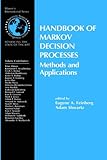Handbook of Markov Decision Processes: Methods and
Handbook of Markov Decision Processes: Methods and Applications (International Series in Operations Research & Management Science)
The theory of Markov Decision Processes – also known under several other names including sequential stochastic optimization, discrete-time stochastic control, and stochastic dynamic programming – studies sequential optimization of discrete time stochastic systems. Fundamentally, this is a methodology that examines and analyzes a discrete-time stochastic system whose transition mechanism can be controlled over time. Each control policy defines the stochastic process and values of objective functions associated with this process. Its objective is to select a “good” control policy. In real life, decisions that humans and computers make on all levels usually have two types of impacts: (i) they cost or save time, money, or other resources, or they bring revenues, as well as (ii) they have an impact on the future, by influencing the dynamics. In many situations, decisions with the largest immediate profit may not be good in view of future events. Markov Decision Processes
List Price: $ 282.00
Price: $ 174.99
Few More:
 Dynamic SOA and BPM: Best Practices for Business Process Management and SOA Agility
Dynamic SOA and BPM: Best Practices for Business Process Management and SOA AgilityAchieve Breakthrough Business Flexibility and Agility by Integrating SOA and BPM Thousands of enterprises have adopted Serv…
 Business Process Change, Second Edition: A Guide for Business Managers and BPM and Six Sigma Professionals (The MK/OMG Press)
Business Process Change, Second Edition: A Guide for Business Managers and BPM and Six Sigma Professionals (The MK/OMG Press)Every company wants to improve the way it does business, to produce goods and services more efficiently, and to increase profits. …
 : Business Process Management and the Balanced Scorecard : Focusing Processes on Strategic Drivers
: Business Process Management and the Balanced Scorecard : Focusing Processes on Strategic DriversBusiness Process Management and the Balanced Scorecard shows managers how to optimally use the balanced scorecard to achieve and s…

